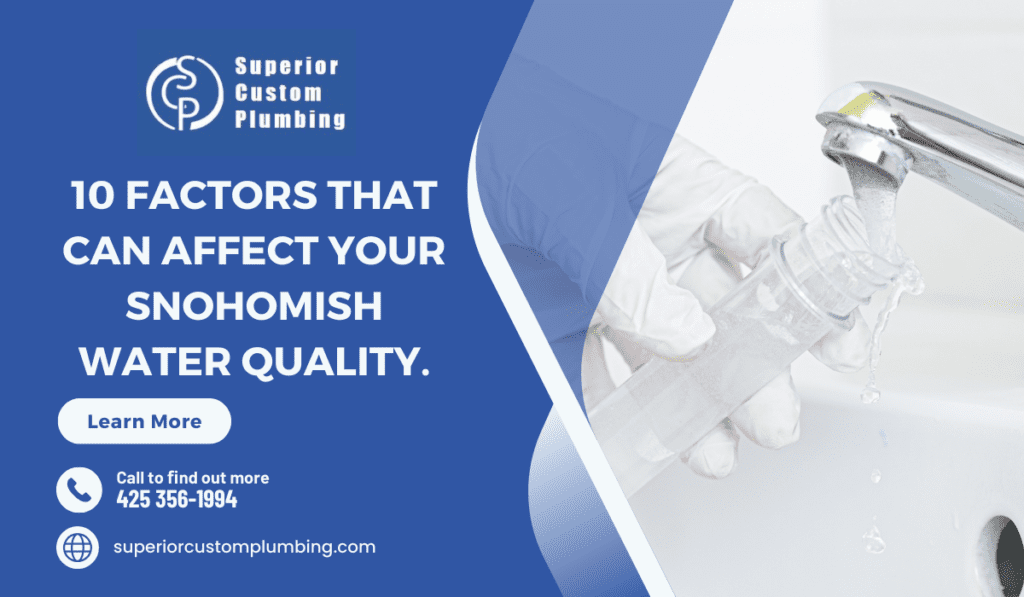
From Contaminants to Pipe Materials. Discover How Your Water is Impacted and What You Can Do to Protect It.
Water quality is a crucial aspect of our everyday lives, and understanding the factors that can affect it is essential for safeguarding the health and well-being of our communities. As far as Snohomish water goes, it is clean. However, If something lurks in your pipes, it could contaminate your water.
This blog will explore ten key factors impacting water quality in Snohomish, Washington. From the treatment process to household practices, we will shed light on the various elements that contribute to the overall water quality in your home.
1. Pipe Material and Age
Different pipe materials can negatively affect water quality in various ways. Corrosion is a significant factor that can release metals and other contaminants into the water.
For example, aging lead pipes can contaminate the water with toxic lead levels, posing health risks. Galvanized steel pipes can corrode over time, resulting in rust accumulation, water discoloration, and taste and odor problems. PVC pipes, commonly used for plumbing systems, can leach chemicals called phthalates, which are known to be endocrine disruptors. Copper and brass pipes may also leach copper, lead, and zinc into the water, affecting its taste and odor.
2. Dumping Yard Waste in Streams
Dumping yard waste such as leaves, grass clippings, and other organic materials into streams can negatively affect water quality. When yard waste breaks down in the water, it can reduce oxygen levels and release nutrients, leading to harmful microorganisms and algae growth.
This process, known as eutrophication, creates an oxygen-deprived environment that is harmful to aquatic life. Yard waste may also contain pesticides, herbicides, and fertilizers that can contaminate the water and harm aquatic animals and people relying on the water supply.
3. Failed Septic Systems
Failed septic systems can release harmful bacteria and pollutants into water sources. Failed septic systems can severely affect water quality, impacting human health and the environment. When a septic system fails, untreated wastewater can contaminate the surrounding soil, groundwater, and surface water sources. This can lead to harmful bacteria, viruses, and parasites in drinking water, causing waterborne illnesses.
4. Fireworks Litter
Fireworks can adversely affect drinking water, particularly when launched near bodies of water or in areas with vulnerable water supplies. Chemical contaminants, such as heavy metals and perchlorates, are released into the air and water during fireworks displays. These chemicals can contaminate the water through fallout, settling on the surface or dissolving into it.
Perchlorates can persist in the environment and interfere with iodine absorption, posing risks to the thyroid gland. Heavy metals, known for their toxicity, can accumulate in aquatic ecosystems and contaminate drinking water sources. To mitigate these risks, fireworks should be launched away from water bodies, and alternative eco-friendly options can be considered to minimize water pollution.
5. Household Hazardous Waste
Improper disposal of household hazardous waste can contaminate water sources. Household hazardous waste (HHW) poses a significant risk to water quality. HHW products, such as household cleaners, batteries, paints, and pesticides, contain harmful chemicals that can contaminate water sources. Improper disposal of HHWs can lead to the seepage of these chemicals into the soil, and rainwater can carry them into nearby bodies of water.
6. Chlorine and Disinfection Byproducts
Although chlorine is used to disinfect water, it can form byproducts that may be harmful.
This contamination adversely affects human health, causing illnesses like cancer and neurological issues. It also harms aquatic life and disrupts ecosystems.
Proper disposal of HHWs is essential to protect water quality and minimize these risks. Recycling, donating unused or unexpired products, and using designated disposal sites are all important steps in managing HHWs responsibly.
7. Nitrates and Contaminants
High levels of nitrates and contaminants can affect water quality and pose health risks. Nitrates are compounds that contain nitrogen and oxygen. They are commonly found in fertilizers, agricultural runoff, and sewage. When nitrates enter water sources such as rivers, lakes, and groundwater, they can contaminate the water.
8. Foam, pH Levels, Petroleum and Oil
These factors can indicate the presence of pollutants in water sources. Foam, pH, petroleum, and oil greatly affect water quality and ecosystems. Foam reduces dissolved oxygen, blocks sunlight, and disrupts the balance of aquatic ecosystems. if acidic or alkaline, pH levels can harm fish, amphibians, and aquatic plants. Petroleum and oil spills smother and suffocate marine life, decrease oxygen levels and introduce toxic substances. Preventive measures are crucial, such as reducing detergent use and monitoring pH levels. Proper storage and transportation practices for petroleum and oil can prevent spills and minimize environmental damage. Managing these factors is essential for preserving aquatic ecosystems and maintaining environmental health.
9. Solid Waste, Waterline Leaks, Cross-Connections, and Backflow Prevention
Solid waste, waterline leaks, improper cross-connections, and backflow can contaminate water. We will discuss these factors’ potential dangers and provide insights into prevention methods.
By understanding the various factors that affect water quality in Snohomish, we can take proactive steps to protect our water resources. We can ensure a sustainable and safe water supply for ourselves and future generations through responsible practices and community awareness.
If you know that your septic system or water is damaged and you decide to repair the system, get the system cleaned out first, then call us when you begin your renovations so we can help you install new plumbing fixtures or help you with a new plumbing plan. We are happy to work with your general contractor for any problems related to new plumbing.
Explore our plumbing services at Superior Custom Plumbing, the premier plumbing contractor in Snohomish. (425)970-9025
